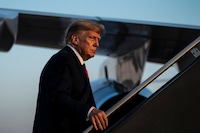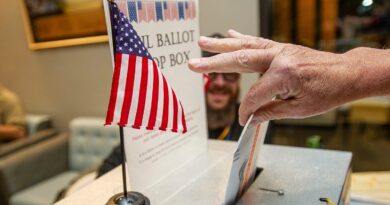Trump-funded studies disputing election fraud are focus in two probes

The decision by then-President Donald Trump’s campaign to spend more than $1 million for two firms to study whether electoral fraud occurred in the 2020 election has become an increasing focus of federal and state investigators in recent weeks, according to people familiar with the matter.
In recent days, the district attorney in Georgia’s Fulton County has asked both firms to provide research and data as investigators intensify their probe into Trump’s attempt to overturn the result of the 2020 presidential election in Georgia.
Not only has the office asked for information and data about Georgia, three people familiar with the inquiries said, but it also is seeking other communications with Trump officials and detailed information about the campaign’s activities in other states. The research is likely to be used as the prosecutors try to build a broader case, alleging racketeering, according to the three people.
In addition, on the federal level, Justice Department special counsel Jack Smith is questioning witnesses about the companies’ work and has obtained hundreds of pages of emails and research, two people familiar with the matter said.
Both firms, Berkeley Research Group and Simpatico Software Systems, are said to be cooperating with the inquiries. The two companies declined to comment for this article. Four others familiar with one or both of the probes spoke on the condition of anonymity to disclose internal details.
Earlier this spring, federal prosecutors obtained evidence from Berkeley employees that former White House chief of staff Mark Meadows had berated employees at the firm after they said there was not enough evidence to overturn results of the 2020 election and encouraged them to find fraud, people with knowledge of the testimony said.
Federal investigators have extensively questioned witnesses about any pressure put on the firms to produce work that would give Trump results he wanted, two people with knowledge of the questioning said.
Additionally, federal authorities have obtained extensive email records from Ken Block, the president of Simpatico Software Systems, according to people familiar with the matter. The emails from Block to Trump’s campaign show in detail that many of the theories — more than a dozen in total — being pushed by Trump’s team were erroneous, and Block explains the research he conducted, the people said.
A person with knowledge of dozens of the emails said that Block at times seemed to be amazed at the theories he was being asked to pursue, along with the shoddiness of the methodology that others had used.
“It’s not appropriate at this time for me to say what I have shared with the grand jury,” Block said, referring to the federal probe.
It is unclear whether charges will be brought by the special counsel’s office or Georgia authorities, and if so, whether the firms’ work would be a large part of any prosecutions. But it has been an increasing focus for prosecutors, who have repeatedly quizzed Trump aides about the work and whether they were familiar with the findings.
The hiring of the firms — which were paid about $1.5 million in total and whose work spanned November and December 2020 — originated from senior White House advisers and campaign officials who wanted to know whether any of the claims of electoral wrongdoing could be verified.
The findings were never released to the public as Trump and a coterie of allies continued to say there was fraud. For example, the reports were not turned over to the House committee investigating the Jan. 6, 2021, attack on the U.S. Capitol, Trump advisers said. The reports were not reviewed by investigators until after The Washington Post reported on their existence, two people familiar with subpoenas in the case said.
Knowledge of the reports in recent months has given prosecutors new witnesses who have described exactly how theories about electoral fraud were debunked in writing, and have said that many campaign and White House advisers knew of the research. The 29-page report from Berkeley and Block’s research show that some of the claims had been debunked even before Trump’s advisers made them publicly.
What prosecutors have sought to show, according to people who have been questioned, is that Trump and aides willfully ignored evidence in their push to raise money and overturn the election, and that a panoply of advisers had access to the data. The evidence is compelling to prosecutors because it is not neutral or third-party groups saying that Trump lost, but instead analysts whose work Trump’s own team commissioned and funded.
Investigators have asked other witnesses — including Chris Krebs, a senior Trump administration official who worked on election security and was fired by Trump on Twitter after declaring the validity of the election — about what briefings and information were provided to the White House about the election being fair and secure, and what attacks officials experienced from Trump for saying the election was not stolen. Prosecutors also have focused on conversations between Trump and his own advisers about whether there was fraud in the election; at least two Trump advisers say they told prosecutors that they conveyed to Trump that they believed he had lost the election.
Some of the accounts from people involved in the work have provided additional details for the period.
When analysts from Berkeley briefed Meadows, presidential lawyer Rudy Giuliani and other senior Trump advisers on their work in late 2020, Meadows told the group there clearly was fraud in the election, these people said. Many of the Berkeley employees were on the phone, while Meadows, Trump and others were in the White House for the meeting, the people said.
Meadows said during the meeting that Berkeley researchers — some of whom were highly trained econometricians — were not looking hard enough for electoral fraud or potentially had an agenda against Trump, even though the firm was being paid by the campaign, and that they should look harder, according to the accounts.
A Meadows spokesman declined to comment.
The firm’s work was disseminated among some of Trump’s senior campaign advisers and White House aides, Trump advisers have testified to the grand jury.
What those emails show is that Trump’s campaign repeatedly sent Block different conspiracy theories to study. Some of the claims came from outside advisers to Trump, while others came from associates and campaign officials.
Through a Trump lawyer, Meadows later sent new claims to the group to study, people familiar with the matter said. “It was like playing whack-a-mole,” said one person with direct knowledge of the process.
What prosecutors have focused on is whether Trump or his aides pressured anyone — and how widely Trump advisers knew about such efforts.
Giuliani and Trump also questioned the firm’s research in the meeting, which grew “rancorous,” as one attendee described it. Another person familiar with the matter said Meadows frequently expressed frustration with the group’s work, and the group had to bat down a range of conspiracy theories.
Some Berkeley employees were frustrated by the meeting, which they feared showed Trump and his team were not interested in the truth, people with knowledge of the matter said.
The relationship between Berkeley and the campaign soon soured. Researchers from the firm decided to put together one final report with their findings and labeled it “confidential” before sending it to a Trump lawyer.
In the days leading up to Jan. 6, Trump campaign officials wanted to release some of Berkeley Research Group’s work to members of Congress, according to people familiar with the matter. Berkeley included in the report some anomalies that did not show fraud but which Trump officials thought might be of interest to members of Congress.
But Berkeley executives believed the election was over — and that their work was commissioned for lawsuits that were unsuccessful.
After the Jan. 6 attack, executives from the Trump campaign said they might ask for a refund on Berkeley’s work. The demand was sent by email, people familiar with the matter said.
Instead of seeking a final payment from the campaign that it was owed, Berkeley decided to drop the matter, these people said. A refund was not given.
Berkeley executives were said to be unhappy later when their work on behalf of Trump emerged publicly, according to people familiar with the matter.

